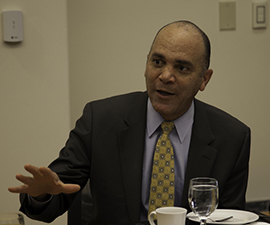O'Connor Advisory Committee Member Cited in Support of Impartial Kansas Courts
 As has become standard operating procedure in the last several sessions, the Kansas legislature is once again considering proposals to alter the process for selecting the state's appellate judges. The house judiciary committee has approved proposals calling for a modified federal selection process (gubernatorial appointment with senate confirmation and periodic retention elections) and for contested partisan elections. Other bills still in committee would raise the retention threshold from a majority to 67 or 70 percent “yes” votes, allow recall of appellate judges, lower the mandatory retirement age for appellate judges from 70 to 65, and alter the selection and composition of the supreme court nominating commission.
As has become standard operating procedure in the last several sessions, the Kansas legislature is once again considering proposals to alter the process for selecting the state's appellate judges. The house judiciary committee has approved proposals calling for a modified federal selection process (gubernatorial appointment with senate confirmation and periodic retention elections) and for contested partisan elections. Other bills still in committee would raise the retention threshold from a majority to 67 or 70 percent “yes” votes, allow recall of appellate judges, lower the mandatory retirement age for appellate judges from 70 to 65, and alter the selection and composition of the supreme court nominating commission.
Opponents of the current commission-based appointment and retention process for supreme court justices hope to place a proposed constitutional amendment on the April ballot.
Chief Justice Lawton Nuss has spoken out against efforts to end Kansas' merit selection process for appellate judges and has found an ally in O'Connor Advisory Committee member and former Chief Justice of Texas Wallace Jefferson. In a recent commentary, Nuss cited Jefferson's concerns about electing judges, expressed in a recent op-ed recognizing the fifth anniversary of the U.S. Supreme Court's Citizens United decision. Jefferson (who ran in statewide partisan elections twice) described the heightened spending in state judicial elections as fostering a perception that "justice is for sale" and undermining the "public's trust in impartial courts." Jefferson went on to advocate for Kansas' existing supreme court selection process, which includes a nominating commission that focuses on judicial candidates' objective qualifications.
According to a recent poll of Kansas voters commissioned by Justice at Stake, Kansans agree with Jefferson. Seventy-six percent oppose moving to a modified federal selection process (up from 61 percent in 2013), and only 31 percent would prefer contested elections of appellate judges.


